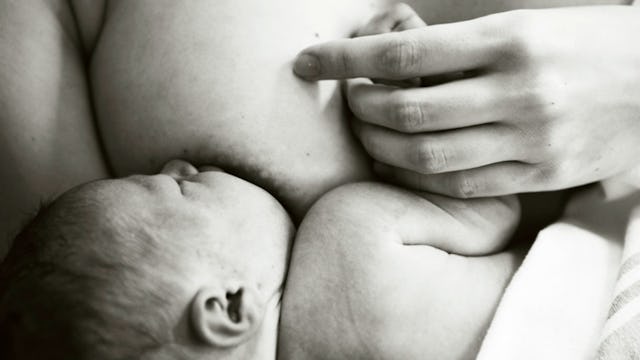How Retrograde Milk Flow Keeps Breastfeeding Moms And Their Babies Healthy

One of the incredible things about breastfeeding is the back-and-forth that happens between moms and babies. Yes, there are those sweet “milk-drunk” smiles – and of course the spit up milk that comes to greet you sometimes after a feeding. But there’s also the mega-cool ways that babies communicate with their mom’s boobs from a biological perspective.
Almost every breastfeeding mom has felt her milk start to leak when she hears her baby cry. Sometimes even just thinking about your baby or smelling something that reminds you of them will do it. That’s because oxytocin, the hormone that causes your milk to contract and eject milk, is controlled in part by your emotions.
Think, too, about the way that your milk supply is determined by how frequently your baby feeds. Ever have a few days where your baby is nursing non-stop and then it’s like Whoa, I suddenly have exploding Dolly Parton boobs! Supply and demand, baby!
Then there’s the way that your milk changes when there’s an illness going around your house. In a nutshell, if you are exposed to a virus or bacteria – even if you aren’t showing symptoms yet – your body starts to produce antibodies and antiviral agents in response. These disease-crushers enter your milk, thereby offering protection to your baby against the illness that is going around.
Really, scientists have only scratched the surface of how breastmilk and moms and babies interact, but there may be yet another mind-blowing fact about all this to add to the mix. Check this one out.
According to Katie Hinde PhD, who is a biologist and associate professor at the Centre for Evolution and Medicine at the School of Human Evolution and Social Change at Arizona State University, your baby might be directly sending information to the breast about their immune status.
The phenomenon — which Hinde describes on her blog, and which she tells Scary Mommy stems from the work of researcher Donna Geddes and her team — is that when your baby nurses, they create a vacuum seal around your breast and their spit (“backwash”) gets sucked back into the nipple, where it is absorbed into the ducts of the breast. This “backwash” contains information about what viruses or bacteria the baby may have been exposed to, causing the mammary glands to change the composition of the breastmilk to help fight illness.
Super cool, right?
“When babies suckle, nipple diameter increases and there is a vacuum with negative pressure, delivering fluids from the infant oral cavity— a cocktail of milk and saliva— back into the ducts of the breast,” Hinde explains, adding, “For the record the technical term for ‘baby spit backwash’ is ‘retrograde milk flow.’”
Retrograde milk flow? Who knew there was such a fancy way to describe that slightly gross mix of spit and milk that often comes trickling out the side of a baby’s mouth. But hey, I’ll take it, especially considering how dang cool this whole thing is.
In her fascinating blog post, Hinde goes into even more detail about how this whole thing works – and yes, it involves snot, so look away if that’s not your thing.
“Depending on the illness, babies shed pathogens from mucus membranes— upper respiratory nasties hitching a ride through runny noses and coughing mouths— mixing together in saliva and snot as babies latch on to suckle at the breast,” writes Hinde. “These naso-oral secretions from the baby backwash into the nipple duct system, bringing the pathogens with them.”
As Hinde explains, contact with these pathogens triggers an immune response inside the breast. We know that our breasts respond strongly to infections, Hinde says – all of us moms who have had mastitis have experienced this first-hand.
“As any mother who has tangled with mastitis can tell you, immune response in the mammary gland is hecka important,” Hinde says. (Yes! And OMG, ouch. Mastitis is the worst.)
Basically, says Hinde, mother’s breasts are amazing, and the way they interact with their babies to keep them well is nothing short of miraculous.
“Mother’s milk is chock-a-block packed with immune molecules,” she writes. “Babies rely on the immunological umbrella of their mother’s breast milk while the baby’s own immune system is naive and developing — this is what makes milk not just food, but also medicine.”
That’s right, mamas. Your milk is more than just food – it’s medicine, tailor-made with your baby in mind. And it’s also comfort and love – don’t forget that either.
Listen, breastfeeding is sometimes hard as hell. It doesn’t come easily or naturally to all of us. Some of us struggle to breastfeed beyond a couple of days or weeks. Remember that every drop of breastmilk a mom gives her baby is full of goodness and totally counts!
And for those of you who continue to breastfeed despite challenges, let cool breastfeeding facts like these motivate you to keep going. You are doing a great job and giving your baby some of the most miraculous food on earth – all from your body, made just for your little one. Rock on, mama.
This article was originally published on